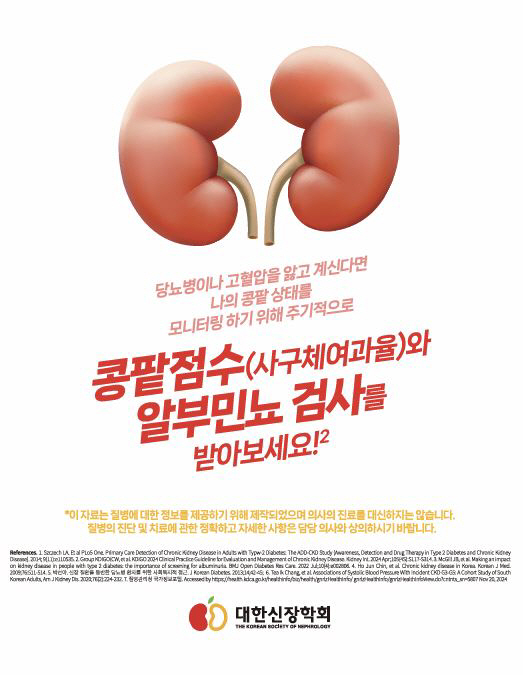The Korean Kidney Association conducts a campaign to distribute self-creative kidney test kits
Apr 09, 2025
The Korean Kidney Society (Chairman Park Hyung-cheon) announced that it will conduct a campaign to distribute self-creative kidney test kits' as part of early diagnosis of chronic kidney disease.
This is the third campaign after 2022, and about 100,000 urine test kits were distributed every year, contributing to raising awareness of chronic kidney disease and early detection.
This campaign is part of the 10-year vision for improving national kidney health, the KHP 2033 (Kidney Health Plan), and any member of the Korean Kidney Association can apply, and applications are available on the official website of the Korean Kidney Association. The application period is until the end of April 2025, and the delivery of kits is expected to be completed on May 10, 2025. Since then, patients with high risk of chronic kidney disease such as high blood pressure and diabetes can receive kits through consultation with medical staff at hospitals and clinics belonging to the Korean Kidney Association.
The Korean Kidney Society's 'KHP 2033'(Kidney Health Plan) proposed that by 2033, ▲ the expected number of chronic kidney disease patients will decrease by 10% ▲ the proportion of end-diabetic kidney disease patients will decrease by 10% ▲ the proportion of home treatment (peritoneal dialysis and organ transplantation) will increase to 33% of patients with end-stage kidney disease.
Chronic kidney disease has been in decline for more than three months, and 13.7% of the population aged 30 or older in Korea suffers from it. The main causes are diabetes and hypertension, and a marked decline in kidney function can lead to a stage requiring dialysis or transplantation. However, since early diagnosis is very difficult because subjective symptoms often appear late, screening tests through regular blood tests and urine tests are important.
Proteinuria, in particular, is an early signal that appears before a decrease in glomerular filtration rate (GFR, kidney score) in many cases, and can also be referred to as a 'yellow card' that warns of chronic kidney disease. Accordingly, identification of proteinuria in high-risk groups (diabetes, hypertension, etc.) for chronic kidney disease plays an important role in early detection of disease and suppression of progression.
Hwang Won-min, Public Relations Director (Konyang University Hospital), said, `Chronic kidney disease is a disease that can slow down the progression only by early diagnosis, and especially those at high risk such as diabetes and high blood pressure must undergo regular checkups at least once a year"I hope this campaign will serve as an opportunity to check your kidney's health."
The Korean Kidney Society plans to carry out various projects such as education and publicity for early diagnosis and treatment of chronic kidney disease in 2025 to realize 'KHP 2033' for improving public health and improving disease prognosis.
This is the third campaign after 2022, and about 100,000 urine test kits were distributed every year, contributing to raising awareness of chronic kidney disease and early detection.
This campaign is part of the 10-year vision for improving national kidney health, the KHP 2033 (Kidney Health Plan), and any member of the Korean Kidney Association can apply, and applications are available on the official website of the Korean Kidney Association. The application period is until the end of April 2025, and the delivery of kits is expected to be completed on May 10, 2025. Since then, patients with high risk of chronic kidney disease such as high blood pressure and diabetes can receive kits through consultation with medical staff at hospitals and clinics belonging to the Korean Kidney Association.
The Korean Kidney Society's 'KHP 2033'(Kidney Health Plan) proposed that by 2033, ▲ the expected number of chronic kidney disease patients will decrease by 10% ▲ the proportion of end-diabetic kidney disease patients will decrease by 10% ▲ the proportion of home treatment (peritoneal dialysis and organ transplantation) will increase to 33% of patients with end-stage kidney disease.
Chronic kidney disease has been in decline for more than three months, and 13.7% of the population aged 30 or older in Korea suffers from it. The main causes are diabetes and hypertension, and a marked decline in kidney function can lead to a stage requiring dialysis or transplantation. However, since early diagnosis is very difficult because subjective symptoms often appear late, screening tests through regular blood tests and urine tests are important.
Proteinuria, in particular, is an early signal that appears before a decrease in glomerular filtration rate (GFR, kidney score) in many cases, and can also be referred to as a 'yellow card' that warns of chronic kidney disease. Accordingly, identification of proteinuria in high-risk groups (diabetes, hypertension, etc.) for chronic kidney disease plays an important role in early detection of disease and suppression of progression.
Hwang Won-min, Public Relations Director (Konyang University Hospital), said, `Chronic kidney disease is a disease that can slow down the progression only by early diagnosis, and especially those at high risk such as diabetes and high blood pressure must undergo regular checkups at least once a year"I hope this campaign will serve as an opportunity to check your kidney's health."
The Korean Kidney Society plans to carry out various projects such as education and publicity for early diagnosis and treatment of chronic kidney disease in 2025 to realize 'KHP 2033' for improving public health and improving disease prognosis.
|
This article was translated by Naver AI translator.














